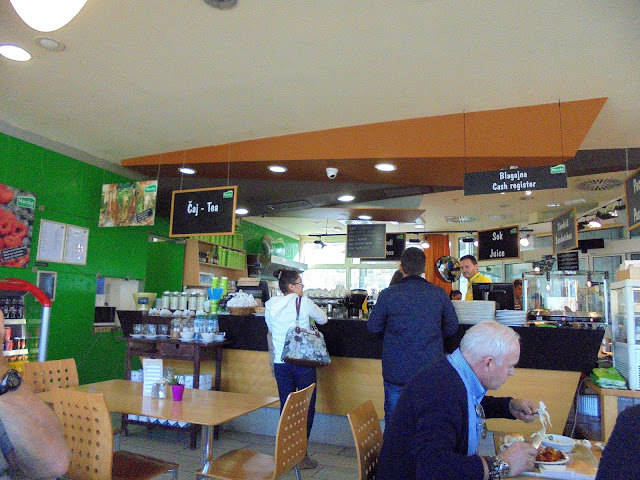In fact, the infrastructure in Croatia was better than in most parts of the rural Western U.S., where we toured in the spring. The wifi, at least, was certainly more reliable. (I'd sure like to see the U.S. start making some investments in our roads, bridges, and digital services before we get left behind! Sorry for the editorial, but it is hard to fathom sometimes.)
My favorite town on the Croatian coast was Rovinj, or Rovigno, in Italian. The Istrian Peninsula, where Rovinj is found, shows the evidence of its Venetian heritage, and the peninsula, which became part of Italy after the breakup of the Austro-Hungarian Empire, was ceded to Yugoslavia after World War II. Consequently, Italian is still often spoken there.
We felt we had come to the Croatian Coast at just the right time. True, the weather made it too cold to swim, but it was still warm enough to eat outside, and the heavy crush of tourists was gone.

We stayed near the harbor in a beautiful little studio apartment above a cafe, and took long walks up the "streets," many of which were only steps. A few art galleries and shops were still open, hoping to catch the last of the tourist trade before winter.
At the top of the town stands the church of St. Euphemia, like a sentinel standing guard over all.
The other side of the town offered vistas too.
Rovinj, like other towns of the Croatian coast, has many wandering cats. They are well-cared-for by the townsfolk. On one of my walks, I encountered a young (Danish?) man who said he had been told that during the time of the plague, the Croatian coast had been relatively spared, because the cats killed the rats that carried the plague fleas. Ever since, he was told by a local, the seaside towns have looked after the cats. These two certainly seemed well fed, and the guy by the harbor has an ideal position:
As you probably know by now, I like cats, so no wonder I liked Rovinj!
Note: One of my regrets about this posting is that I've not been able to find the photo I took of the young woman, Francesca, who helped us settle into our apartment in Rovinj. Attractive, smart, and fluent in English, she impressed us, and we liked her a lot. She seemed to embody so many of the young people we met in Croatia and Slovenia. She exuded optimism--and I liked that!
My favorite town on the Croatian coast was Rovinj, or Rovigno, in Italian. The Istrian Peninsula, where Rovinj is found, shows the evidence of its Venetian heritage, and the peninsula, which became part of Italy after the breakup of the Austro-Hungarian Empire, was ceded to Yugoslavia after World War II. Consequently, Italian is still often spoken there.
We felt we had come to the Croatian Coast at just the right time. True, the weather made it too cold to swim, but it was still warm enough to eat outside, and the heavy crush of tourists was gone.

We stayed near the harbor in a beautiful little studio apartment above a cafe, and took long walks up the "streets," many of which were only steps. A few art galleries and shops were still open, hoping to catch the last of the tourist trade before winter.
At the top of the town stands the church of St. Euphemia, like a sentinel standing guard over all.
The other side of the town offered vistas too.
Rovinj, like other towns of the Croatian coast, has many wandering cats. They are well-cared-for by the townsfolk. On one of my walks, I encountered a young (Danish?) man who said he had been told that during the time of the plague, the Croatian coast had been relatively spared, because the cats killed the rats that carried the plague fleas. Ever since, he was told by a local, the seaside towns have looked after the cats. These two certainly seemed well fed, and the guy by the harbor has an ideal position:
As you probably know by now, I like cats, so no wonder I liked Rovinj!
Note: One of my regrets about this posting is that I've not been able to find the photo I took of the young woman, Francesca, who helped us settle into our apartment in Rovinj. Attractive, smart, and fluent in English, she impressed us, and we liked her a lot. She seemed to embody so many of the young people we met in Croatia and Slovenia. She exuded optimism--and I liked that!
These young countries are just getting ready to claim their place on the world stage, and doing a remarkable job of catching up, and the young people seem to realize that they will play a role in making this new world. After the terrible wars here in the late 20th Century, it made us feel good. Their hopes are contagious!









No comments:
Post a Comment